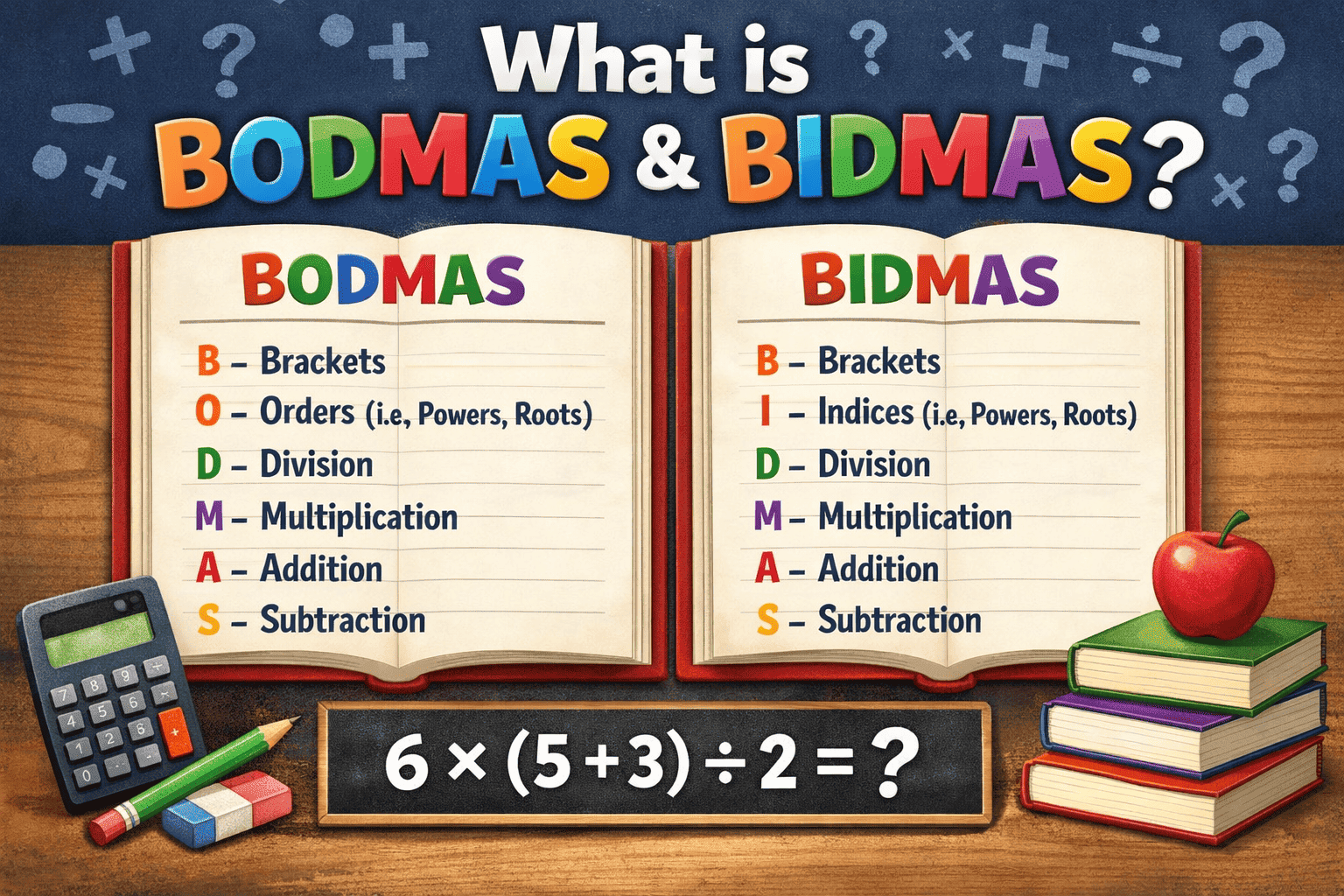
In the UK education system, GCSE Maths and A-Level Maths are two important qualifications that mark significant milestones in a student's academic journey. GCSE Maths provides a broad foundation covering essential maths skills, while A Level Maths builds on this foundation with greater depth, complexity and application of concepts like calculus and advanced algebra.
Understanding the differences between GCSE Maths and A Level Maths helps students, parents, and educators make informed decisions about future education and careers. This knowledge ensures a smoother transition and highlights the increasing demands of A Level Maths, preparing students for higher education and STEM-related opportunities.
What is GCSE Maths?
GCSE Maths is a fundamental qualification in the UK education system designed to build a strong foundation in essential mathematics. It focuses on practical and theoretical skills that students use in everyday life and further studies. This qualification is crucial for personal academic growth and opens doors to many career options.
Core Focus and Typical Topics Covered
GCSE Maths covers a broad range of important topics to equip students with versatile mathematical skills:
- Number operations and fractions
- Algebra and equations
- Geometry and measures
- Probability and statistics
- Ratios and proportions
This comprehensive syllabus ensures that students develop a well-rounded understanding of mathematics relevant for real-world problem-solving and higher education.
Exam Structure and Grading System
Understanding how GCSE Maths is assessed can help you prepare effectively:
- Exams are typically divided into Foundation Tier (grades 1-5) and Higher Tier (grades 4 -9), allowing you to be assessed at your level of capability.
- The grading system ranges from 9 (highest) to 1 (lowest). A grade 4 is a standard pass, and a 5 is considered a strong pass.
- Exams typically consist of multiple papers focusing on different maths skills, with some allowing calculators and others not.
This structure is designed to fairly assess your skills while encouraging steady progress and mastery.
What is A Level Maths?
A Level Maths is an advanced qualification that builds upon the foundation laid by GCSE Maths, designed for students ready to deepen their mathematical understanding and problem-solving skills. It presents an expanded syllabus that challenges individuals with more complex concepts and applications.
Expanded Syllabus and Deeper Content
- Covers three main areas: Pure Mathematics, Mechanics, and Statistics.
- Focuses on developing logical reasoning, mathematical arguments, and modeling real-world problems.
- Encourages independent thinking and analytical skills beyond GCSE level.
Topics in A Level Maths
Pure Maths:
- Proof
- Algebra and Functions
- Coordinate Geometry
- Sequence and Series
- Trigonometry
- Exponential and Logarithms
- Differentiation and Integration
- Numerical Method
Statistics and Mechanics:
- Statistical Sampling
- Data Presentation and Interpretation
- Probability
- Statistical Distribution
- Statistical Hypothesis testing
- Quantities and Units in Mechanics
- Kinematics
- Forces and Newton’s Law
- Movements
Exam Format and Assessment Style
- Typically consists of three 2-hour papers covering pure maths, mechanics, and statistics.
- Questions vary from short answers to complex problem-solving tasks.
- Each paper contributes equally to the final grade, rewarding both correct answers and methods.
This qualification suits motivated individuals aiming for STEM courses and careers where strong analytical abilities are essential.
Differences Between GCSE and A Level Maths
GCSE Maths and A Level Maths differ significantly in content, depth, and skills required, impacting individual students’ learning and progress. Understanding these differences helps learners prepare effectively for the jump and tailor their study habits according to the new demands. Below is a detailed comparison focusing on what individuals can expect at each stage.
|
Aspect |
GCSE Maths |
A Level Maths |
|
Content Breadth |
Covers a wide range of foundational topics: arithmetic, basic algebra, geometry, statistics, and probability. Focuses on solidifying essential maths skills. |
Focuses on fewer but deeper topics including calculus, advanced algebra, proof, mechanics, and statistics, demanding a higher analytical ability. |
|
Difficulty and Depth |
Introduces mathematical concepts with guided and structured problems, easier calculations, and more straightforward questions. |
Requires deeper theoretical understanding, problem-solving skills, and independent thinking. Questions are often multi-step and open-ended. |
|
Algebra Usage |
Basic algebra is introduced but often avoided with simpler numeric methods. |
Algebra is the main language; students must be comfortable manipulating complex algebraic expressions and top-heavy fractions. |
|
Calculator Use |
Limited to specific papers; emphasis on non-calculator skills. |
Calculator use is allowed for all papers, using advanced scientific calculators; mental math speed remains important. |
|
Exam Format |
Multiple papers with similar formats, mixing calculator and non-calculator questions. |
Three calculator papers focused on pure maths, mechanics, and statistics, with tougher, diverse questions. |
|
Study Style and Independence |
Mostly classroom-led with guided practice and revision. |
Requires significant independent study and self-discipline to grasp abstract concepts and complete challenging problem sets. |
|
Career and Academic Impact |
Foundation for further study; necessary for many educational and vocational paths. |
Essential for STEM degrees and careers; develops advanced mathematical reasoning and problem-solving suitable for university level. |
How Big is the Jump from GCSE to A Level Maths?
The transition from GCSE Maths to A-Level Maths is significant and can be daunting for many students. A Level Maths demands a deeper understanding of concepts, greater problem-solving skills, and a higher level of independent study. This transition often exposes gaps in fundamental skills, especially in algebra, functions, and problem-solving, which can make the first year challenging and lead some students to struggle or drop out.
Challenges Students Face Transitioning
- Increased workload and complexity of content
- Need for advanced algebraic fluency and abstract thinking
- Shift from broad topics to more specialised, in-depth study
- Higher expectations for independent learning and time management
Importance of a Strong GCSE Foundation
- A solid GCSE base, typically a grade 7or above, is crucial for success in A Level Maths.
- Mastery of core skills like algebra, indices, and coordinate geometry eases the jump
- Students without strong fundamentals may need extra preparation before starting
Tips for Managing the Increased Difficulty
- Engage in summer bridging work or transition tasks to reinforce key GCSE topics
- Develop a structured study schedule to manage the workload effectively
- Seek extra help from tutors or revision classes early on to address weak areas
- Practice regularly to build confidence and fluency in problem-solving skills
With the right preparation and support, students can successfully navigate the jump and excel in A Level Maths.
Why Choose A Level Maths?
For individuals aiming to unlock vast opportunities in higher education and future careers, A Level Maths is a strategic choice. This qualification is highly valued by top universities, especially for STEM (Science, Technology, Engineering, Mathematics) courses. Choosing A Level Maths can open doors to prestigious universities and provide a competitive edge in admission processes, making it a powerful asset for your academic journey.
Benefits for Higher Education and STEM Careers
- Widely recognised by universities, especially Russell Group institutions
- Essential for degrees in engineering, physics, computer science, economics, and more
- Enhances chances of admission to competitive STEM courses
- Opens pathways to diverse STEM careers like data science, engineering, finance, and technology
- Supports interdisciplinary studies, strengthening subjects like economics and geography
Development of Advanced Problem-Solving Skills
- Builds critical thinking and analytical abilities
- Trains you to approach complex problems methodically
- Develops skills in logical reasoning and mathematical proof
- Encourages independent learning and perseverance
Equips you with research skills to investigate solutions and theories
Choosing A Level Maths isn’t just about furthering your mathematical knowledge; it cultivates essential skills that empower you to succeed in university and beyond, both academically and professionally.
Looking for expert A Level Maths classes for your child? MathsAlpha offers professional tutoring for A Level students and comprehensive Maths support from Year 7 to Year 11. Our experienced tutors help build strong foundations and boost confidence in Maths. Join MathsAlpha today for quality learning and excellent results!
Enroll now! Contact us at info@mathsalpha.com or call +44 7834 229046 for Maths classes across the UK.
Frequently Asked Questions
Recent Blogs
-
.png) 15 Jan 2026
15 Jan 2026How Much Does a Maths Tutor Cost?
-
.png) 14 Jan 2026
14 Jan 2026How to Make a Revision Timetable for Exams
-
 08 Jan 2026
08 Jan 2026What Is BODMAS and BIDMAS?
-
 03 Jan 2026
03 Jan 2026How to Calculate Probability for GCSE Maths
-

-
 04 Dec 2025
04 Dec 2025A-Level Maths Questions Students and Parents Ask
-
 18 Nov 2025
18 Nov 2025Why Do Kids Struggle with Geometry?
-
 14 Nov 2025
14 Nov 2025Who Invented Zero and How It Changed Maths
-
 11 Nov 2025
11 Nov 2025What Is A Prime Number?
-

-
 03 Oct 2025
03 Oct 2025How to Get an A* in A Level Maths
-

-
 25 Sep 2025
25 Sep 20255 Tips for Success in Maths Exams
-
 16 Sep 2025
16 Sep 2025How Maths Is Used in Everyday Life - 11 Examples
-
 09 Sep 2025
09 Sep 2025GCSE Maths Guide for Parents and Students
-
 05 Sep 2025
05 Sep 2025What is the Year 9 Maths Curriculum?
-
 04 Sep 2025
04 Sep 2025Algebra Guide for Parents to Support Children
-
 01 Sep 2025
01 Sep 2025A Level Maths Topics and Exam Success Guide
-
 23 Aug 2025
23 Aug 2025What is Covered in Year 7 Maths Curriculum?
-
 12 Aug 2025
12 Aug 2025How to Choose the Right Maths Tutor in the UK?










